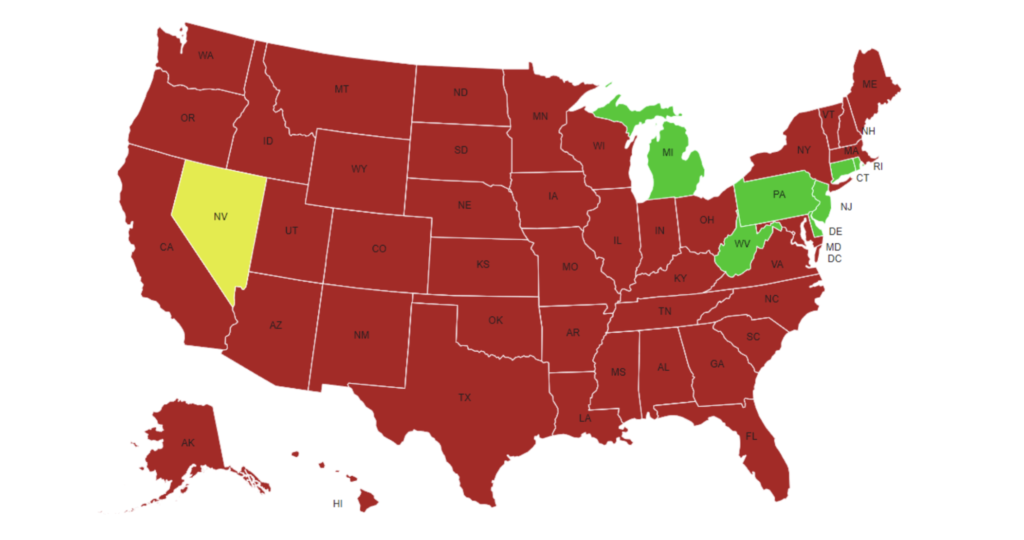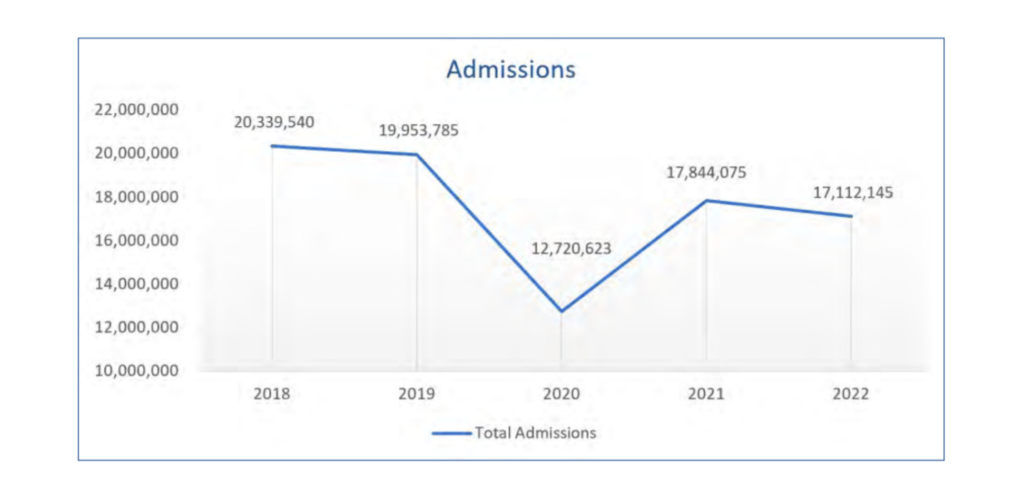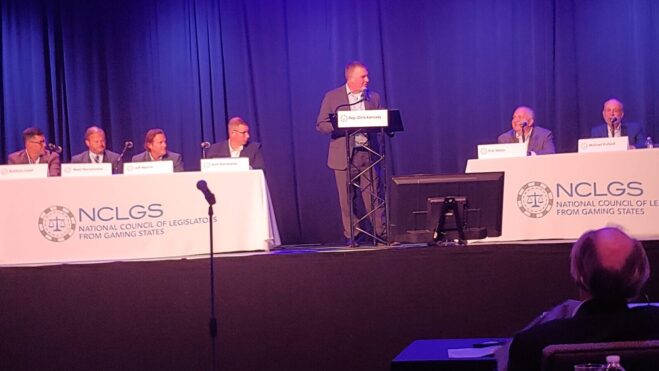The Ruddock Report: Revising Estimates Downward
Our monthly look at the online casino landscape explains the current pessimism over legalization but offers one possible silver lining.
4 min

Our monthly look at the online gambling landscape includes the current legal and regulatory scene, prospective online casino and online poker states, and significant trends to watch.
With online casino legalization on the verge of being shut out in 2024, the candidate map is in flux. Yes, some new hopefuls have emerged, but the overall trend is increasingly negative as supporters try to contend with several seemingly insurmountable obstacles:
- Stakeholder divides
- Opposition from organized labor
- Cultural opposition to gambling
- The fallout from the legalization of mobile sports betting
How dire is the situation? In its recent 1Q24 Earnings Recap, research firm Eilers & Krejcik Gaming summarized the legalization landscape: “We estimate only four new online casino states over the next five years — an estimate we will soon revise downward.”
Bottom line: The current map (seen below) is unlikely to change anytime soon.
LEGAL ONLINE GAMBLING ONLINE POKER-ONLY

The difficulties in 2025
Last month, I discussed the difficulty of passing legislation during election years. Politicians spend their free time on the campaign trail, and partisanship increases as the minority party doesn’t want to hand the party in power what could be construed as a political victory.
Non-election years have their own challenges. State legislatures have enormous turnover, including leadership assignments. There are new committee chairs, and gambling, being a niche topic, requires significant amounts of education.
Take a state like Maryland, which holds state elections every four years in mid-term years — the next election is in 2026. After the 2018 election, 60 seats changed hands, including 43 in the House of Delegates. In 2022, 48 seats changed hands, with 40 new House of Delegates members sworn in.
Back-of-the-envelope math shows that in each of the last two elections, one out of every four members of the House of Delegates was new.
This type of turnover occurs in numerous jurisdictions across the country, and unlike Maryland, many state representatives are up for reelection every two years.
A silver lining?
The good news is that something has to give. I mean, it has to … right? Right?
The pandemic was a boon for state budgets propped up with federal money. That money is running dry, and states are returning to their previous modus operandi of searching the couch cushions for new revenue wells to pump. One of those wells is gambling, which states have been pumping for two decades.
However, if the impetus for legalization is money, don’t expect to see the moderate tax rates and licensing fees some states were willing to bless the sports betting industry with — a gift some states are now asking the industry to return.
Rhode Island was the last state to legalize online casino games. The state imposed a hefty 61% tax rate on slots and a reasonable 15% rate on table games, which are limited to live-dealer tables.
Taxes became a sticking point in Maryland, where the proposed rates reached Rhode Island levels: 55% on slots and table games and 20% on live-dealer tables. Maryland’s bill was ultimately defeated, but the trend is skewing toward very high tax rates. That will sow industry divisions and erode support, as some stakeholders may be willing to accept the heavy burdens, some will be more reluctant, and some will outright oppose it.
Looking ahead to 2025 and beyond
The chart below provides one perspective on the outlook for online casino legalization in the coming years.
With so few realistic candidates, Casino Reports has shifted from possible expectations for legalization to when conversations could begin in earnest. Legalization would occur two to five years later.
As always, a dark horse could emerge at any point.
| 2025 | 2026 | 2027 |
| New Hampshire | Indiana | Colorado |
| Maine | Wyoming | Ohio |
| Maryland | Louisiana | Kentucky |
| Iowa | North Carolina | Virginia |
| New York | Illinois | Florida |
| Arkansas | Massachusetts | Georgia |
Candidate Spotlight: Iowa
Iowa popped up as an online casino candidate in 2023 following the introduction of a bill by state Rep. Bobby Kaufmann.
After an uneventful 2023, Kaufmann termed 2024 an “education year,” and it appears 2025 will be pretty much the same.
Looking ahead to next year, Kaufmann told Bonus.com that despite some interest in his online casino bill, “I think it’s accurate that 2025 is an unlikely year.”
Wes Ehrecke, president and CEO of the Iowa Gaming Association, echoed those sentiments, telling Bonus that 2025 does not look good.
The stumbling block is familiar: stakeholder disagreement over the impact of online casino gambling. That’s unsurprising, considering the Iowa casino industry is a mix of tribes, national commercial casino operators, and local/regional operators.
Given the challenges, why is Iowa a contender?
As I wrote in my Straight to the Point newsletter, Iowa casino and sports betting revenue is declining, as are admissions to Iowa casinos, which have steadily declined since 2018.

Source: Iowa Racing & Gaming Commission 2022 Report
Two fiscal reasons drive gambling expansions:
- Budget shortfalls
- Declining revenues from existing gambling operators
As the Iowa Capital Dispatch noted, “Iowa ended Fiscal Year 2023 with a $1.83 billion surplus in the general fund, in addition to $2.74 billion in the state’s Taxpayer Relief Fund and $902 million in reserve funds, according to the March Revenue Estimating Conference.”
However, that surplus could evaporate as Iowa has cut personal and corporate taxes, which goes into effect in 2025. With that in mind, keep an ear to the ground for remarks from stakeholders and key legislators, which could serve as a bellwether for 2026.
Trends to watch
Trend #1: Bypassing legislative stalemates via referendum
The same legislatures that embraced sports betting have grown less receptive to it lately. This is particularly true of online casinos, which have raised cannibalization and job-loss concerns that didn’t exist with sports betting.
2024 was shut out legislatively, but one serious candidate still exists: Missouri. The Show-Me State used the referendum process to bypass the legislature, which is a roadmap online casino supporters should follow — as Maryland did this year, and Maryland came closer to legalizing online casinos than any other state.
Online casino legalization hopes in 2025 and beyond will hinge on referendums.
Trend #2: Poker is back
WSOP.com has rebranded to WSOP Online following the merging of its player pools in Nevada, New Jersey, and Michigan ahead of the 55th World Series of Poker tournament series in Las Vegas.
Even though this is not the arrival of a new online gambling state, it should still be viewed as a big win.
There are two more online poker states that could also link up, but each has a hurdle to overcome:
- West Virginia has already joined the Multi-State Internet Gaming Association (MSIGA) but has no active online poker operators.
- Pennsylvania has active online poker operators but hasn’t joined MSIGA.





